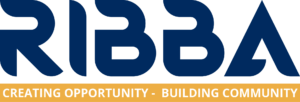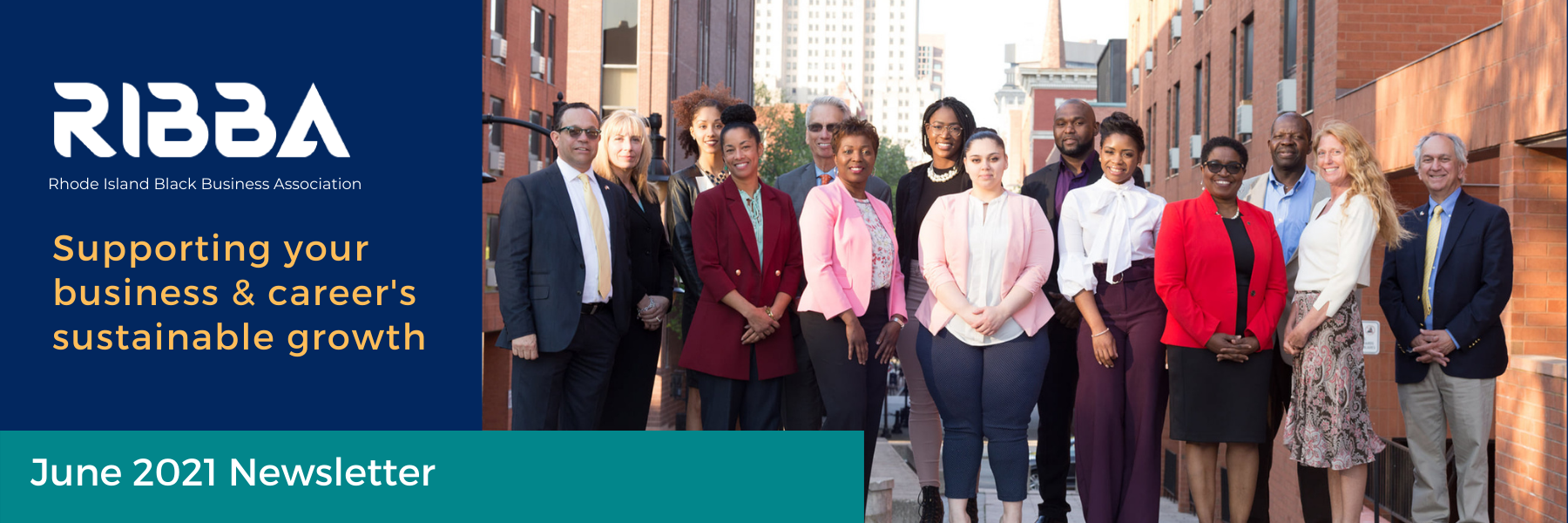LEAP Mentor Program – 3rd Cohort Launched!
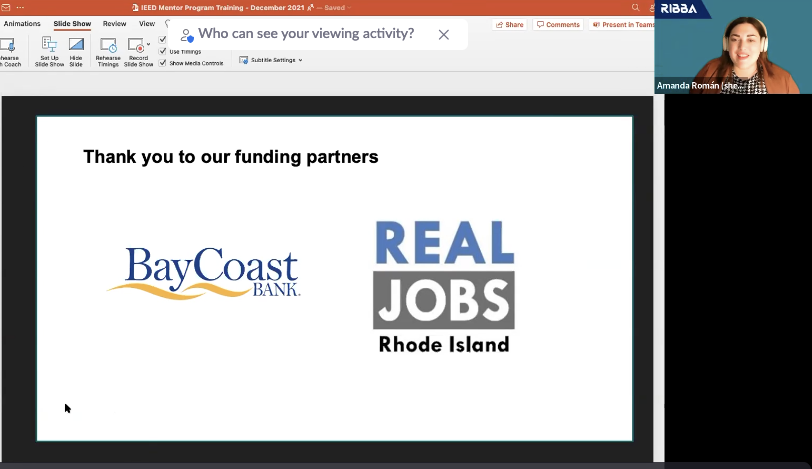
Emerging Leader Highlight: Edinalia Lopes
Edinalia Lopes is a Financial Analyst at IGT and a participant in the inaugural Emerging Leaders Development Program provided by RIBBA.
1. What has being a part of the Emerging Leaders Program meant to you?
Being part of the Leadership program means many different things for me. It gives me a chance to network with other professionals from RI, from different industries/cultures. Though I am not currently in a leadership position, this program caught my eye because I would like to grow in my career and this program is a way for me to learn more about what I personally need to get there. I wish this type of program was part of college/grad school curriculum because so many of the things we are learning can help everyone not only in their careers but also understand what leadership qualities they have and what they need to work on to strengthen. The program has given me a chance to step back from the day to day things I do for my career and evaluate myself; learn more about myself and learn about what qualities I have to become a great leader.
2. What’s the most significant think you’ve learned so far?
The program is teaching me more on how to be a genuine/unique leader and I feel like I couldn’t learn that elsewhere. Before this I felt like I had to fit a mold and follow what past leaders have done to be successful but now I am starting to understand how my unique abilities and characteristics can help me get to where I want to go. I think that is the most significant thing I have learned; that I can become a leader using my own strengths and not have to change everything about myself to be the type of a leader that others might expect me to be.
3. How has understanding your strengths changed the way you see yourself?
First of all, there were some things about myself that I didn’t know were strengths for great leaders! For example, when we took the assessment test and one of my qualities came out to be Empathy. I now realize how big of a strength empathy is for a leader, whereas before I thought of it as more of a weakness. I thought it would be seen as “caring too much” or “feeling too much”; now I see that it is one of the best qualities, especially now that I understand more about emotional intelligence and using it to lead. We are only half way through the program and I feel like I’ve learned so much about myself so far.
I think this program would be beneficial for anyone, In any area of work or career levels. Learning about our strengths, how to use our unique abilities, emotional intelligence and understanding the difference between managing and leading, is greatly needed! It can be an asset to someone just coming out of college or someone who’s been in their career for years; you can learn new things about yourself at any stage of life. Someone starting their careers can use this program to get a leg up, learn and hone on their strengths; and someone further in their career can learn new ways to lead and strengthen some of the characteristics they might not have given importance to, in the past. The world is changing and we can ‘t assume that the old ways of leading will keep working, so I would highly recommend this program to everyone!
The Emerging Leaders Development Program is free for participants through funding received by the RI Department of Labor and Training and is delivered by RIBBA in partnership with the University of RI Office of Strategic Initiatives.
RIBBA Issues a Failing Grade and Call to Action to the State of Rhode Island
- Establish a Contract Compliance office outside of government to monitor and enforce compliance to MBE commitments
- Mandate when a prime contractor fails to meet the goal of awarding 10% of the prime contract to a M/WBE, that prime contractor must submit good faith documentation indicating efforts to engage and hire minorities or women, a requirement existing as far back as 1996
- Investigate complaints of non-compliance and develop corrective action plans as needed
- Implementation of MBE/WBE tracking of comprehensive data on the subcontracts awarded by the prime contractors
- Increase the government procurement participation goal for Black and Latino contractors to reflect the increased minority population in RI
- The state must set up, and financially assist organizations that provide support to Black businesses so that they too can grow and thrive
- Issue an Executive order to establish preference in state contracts where Black and brown people are the predominant group to be served or when contracts are cited within a neighborhood where the population is 20% or more minority
- Commit at least 20% of funding to economic development in Black and brown communities
- Intentionally work with organizations led by Black and Latino leaders
- Increase loan funds available through Black and Latino organizations
- Establish clear lines of authority to the office of the Attorney General or other legal entity to ensure enforcement
- Implement a Pay Audit System to be used by Prime Vendors and their Subcontractors to independently report payments from Prime Vendors to the Subcontractors on state contracts.
Born to Lead-Business Highlight: Born-O Uniforms
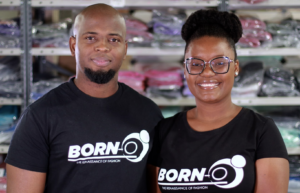
RIBBA’s mission is made possible by a stellar community of businesses, staff, volunteers, and supporters. We’d like to place a spotlight on one of the members of this incredible network: Born-O Uniforms.
Elisabeth Borno, CEO & Co-Founder of Born-O Uniforms, knew from an early age that she wanted to pursue an entrepreneurial path. During her childhood, she learned firsthand about the opportunities and challenges of business ownership as her parents, originally from Haiti, did this successfully, and in turn helped her to create a similar life vision. Knowing full well the dynamic journey of being an entrepreneur, Elisabeth’s mother encouraged her to have another formal career before venturing into business full time. Although her steps did not take her down this road immediately, she upheld the patience and tenacity to keep moving toward her dream despite obstacles along the way.
As a survivor of a 7.0 magnitude earthquake and having experienced homelessness, Elisabeth is very familiar with overcoming adversity. Two of the most outstanding and consistent aspects of Elisabeth’s story are her unwavering commitment to her life’s vision, as well as her incredibly resilient and vibrant spirit. Three months after surviving the earthquake, Elisabeth’s parents made arrangements for her to attend nursing school in the Dominican Republic. It was during her time on the front lines of the nursing profession that she found her passion and witnessed a need for increased access to high quality medical resources. After considering how she could combine her passion for serving her community and giving back with ensuring appropriate access to quality medical resources, Elisabeth co-founded Born-O Uniforms along with her husband, Yves, in 2018.
An advocate for mental health and equity, Elisabeth incorporates these causes into her work every day. For her customers, she ensures that medical professionals have the appropriate attire and resources to focus on their work rather than stressing about how to prepare. For her staff, she supports and mentors team members from various backgrounds, experiences, and skillsets in order to help facilitate understanding and empathy for the customer community. What sets Born-O Uniforms apart from other similar businesses is a close-knit, family feeling among customers and a focus on price, comfort, and quality. Elisabeth, Yves, and their team make it their mission to provide ready-made medical resources for their customers. This includes uniforms of all sizes that are wrinkle-free, soil resistant, and anti-microbial as well as stethoscopes, bags, badge reels, and other accessories to facilitate safety and comfort and lessen the burden on this community.
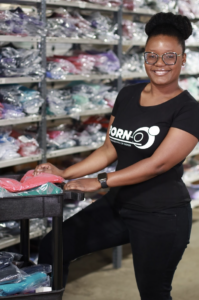 Despite Elisabeth’s resiliency and steadfast commitment, she has faced challenges as an entrepreneur, and particularly as a business owner that identifies as a woman of color. Elisabeth, along with many other BIPOC business owners, faces questions of competency, limited access to resources, and fewer opportunities to advance and grow a network. According to Elisabeth, the key to making entrepreneurship more equitable is to “eliminate bias first” and then all else will follow. It is for these reasons among others that organizations like RIBBA are so essential to the success and growth of BIPOC owned businesses like Born-O Uniforms. Elisabeth and Born-O have received a myriad of services from RIBBA including grants, loans, capacity building and operational services, and marketing assistance. Elisabeth is grateful to RIBBA for making the journey of being a business owner much smoother as Born-O navigates their next phase and experiences growth at a fast pace.
Despite Elisabeth’s resiliency and steadfast commitment, she has faced challenges as an entrepreneur, and particularly as a business owner that identifies as a woman of color. Elisabeth, along with many other BIPOC business owners, faces questions of competency, limited access to resources, and fewer opportunities to advance and grow a network. According to Elisabeth, the key to making entrepreneurship more equitable is to “eliminate bias first” and then all else will follow. It is for these reasons among others that organizations like RIBBA are so essential to the success and growth of BIPOC owned businesses like Born-O Uniforms. Elisabeth and Born-O have received a myriad of services from RIBBA including grants, loans, capacity building and operational services, and marketing assistance. Elisabeth is grateful to RIBBA for making the journey of being a business owner much smoother as Born-O navigates their next phase and experiences growth at a fast pace.
As Born-O Uniforms moves forward in their trajectory as a business, increased and aligned funding sources will be key to success. The team has already proven themselves and their business model to be effective, which continues to be evident as they grow. For example, the team is currently hard at work on a brand re-vamp and launch of new products that they are very excited about. Elisabeth admits it is not an easy path to manage a business, particularly because you can’t “check out”; but rather, you are always thinking about how to make your business better and considering its progress. With this in mind, her mantra is “If you’re running and it feels like too much, you can walk”, or, adjust your strategy or task to match your energy until you are ready to go back to where you started. To rising entrepreneurs, Elisabeth advises “don’t give up”; and in business and in life, she never has. As a business owner, family woman, nurse, student, recent graduate, and military personnel, Elisabeth holds many different roles. She is a firm believer that when challenges happen, it is critical to find a way to turn them into the best outcome possible as well as to use your story and what happens to you to become resilient and build yourself up. That is her story, and we hope, along with Elisabeth, that it will be the story of many rising entrepreneurs of diverse backgrounds. With continued support of businesses like Born-O and organizations like RIBBA, it will continue to be a reality.
For more information about Born-O Uniforms, please visit: https://www.bornouniforms.com/
For more information about RIBBA, please visit: https://ri-bba.org/
About the author: Stephanie Mireku is RIBBA’s volunteer Content Writer and works with businesses, volunteers, and community members to highlight their and RIBBA’s work. Her passion for writing of all kinds, and background in English and Business Administration fueled her interest in combining these areas through the Content Writer role. Stephanie first became involved with RIBBA through the LEAP Mentoring program as a mentee in the 2021 cohort. She is enthusiastic about relationship building, mission centric creativity, social impact, and philanthropy, and puts this into action through various outlets including her work as an Assistant Director of Alumni Relations at Providence College.
